| Listing 1 - 9 of 9 |
Sort by
|

ISBN: 9781136064265 1299479480 1136064265 9780203616802 0203616804 9780415935722 0415935725 9780415935739 0415935733 9781136064340 9781136064425 1136064346 9781299479487 Year: 2005 Publisher: New York, N.Y. : Routledge,
Abstract | Keywords | Export | Availability | Bookmark
 Loading...
Loading...Choose an application
- Reference Manager
- EndNote
- RefWorks (Direct export to RefWorks)
'Being White' explores what the author calls 'everyday whiteness,' that is, whiteness as lived by everyday experience. This volume aims to shed light on a rarely studied or discussed topic.
Whites --- Youth --- Race awareness --- Race identity --- Attitudes. --- White persons --- Ethnology --- Caucasian race --- White people
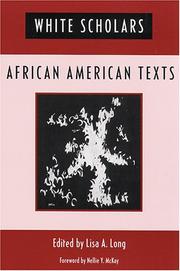
ISBN: 1282133675 9786613806253 0813537738 9780813537733 9780813535982 0813535980 9780813535999 0813535999 Year: 2005 Publisher: New Brunswick, N.J. : Rutgers University Press,
Abstract | Keywords | Export | Availability | Bookmark
 Loading...
Loading...Choose an application
- Reference Manager
- EndNote
- RefWorks (Direct export to RefWorks)
What makes someone an authority? What makes one person's knowledge more credible than another's? In the ongoing debates over racial authenticity, some attest that we can know each other's experiences simply because we are all "human," while others assume a more skeptical stance, insisting that racial differences create unbridgeable gaps in knowledge. Bringing new perspectives to these perennial debates, the essays in this collection explore the many difficulties created by the fact that white scholars greatly outnumber black scholars in the study and teaching of African American literature. Contributors, including some of the most prominent theorists in the field as well as younger scholars, examine who is speaking, what is being spoken and what is not, and why framing African American literature in terms of an exclusive black/white racial divide is problematic and limiting. In highlighting the "whiteness" of some African Americanists, the collection does not imply that the teaching or understanding of black literature by white scholars is definitively impossible. Indeed such work is not only possible, but imperative. Instead, the essays aim to open a much needed public conversation about the real and pressing challenges that white scholars face in this type of work, as well as the implications of how these challenges are met.
Education, Higher --- Teachers, White --- Whites --- African Americans --- American literature --- White teachers --- White people --- White persons --- Ethnology --- Caucasian race --- African American intellectuals --- English literature --- Agrarians (Group of writers) --- Afro-Americans --- Black Americans --- Colored people (United States) --- Negroes --- Africans --- Blacks --- Political aspects --- Social aspects --- Intellectual life. --- African American authors --- Study and teaching. --- Historiography. --- Study and teaching (Higher) --- United States --- Race relations. --- Race question --- Black people
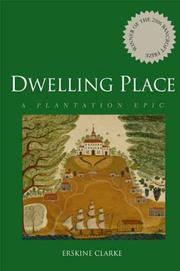
ISBN: 9780300122565 9786611731458 0300133286 9780300133288 9780300108675 0300108672 1281731455 9781281731456 6611731458 Year: 2005 Publisher: New Haven [Conn.] : Yale University Press,
Abstract | Keywords | Export | Availability | Bookmark
 Loading...
Loading...Choose an application
- Reference Manager
- EndNote
- RefWorks (Direct export to RefWorks)
Published some thirty years ago, Robert Manson Myers's Children of Pride: The True Story of Georgia and the Civil War won the National Book Award in history and went on to become a classic reference on America's slaveholding South. That book presented the letters of the prominent Presbyterian minister and plantation patriarch Charles Colcock Jones (1804-1863), whose family owned more than one hundred slaves. While extensive, these letters can provide only one part of the story of the Jones family plantations in coastal Georgia. In this remarkable new book, the religious historian Erskine Clarke completes the story, offering a narrative history of four generations of the plantations' inhabitants, white and black.Encompassing the years 1805 to 1869, Dwelling Place: A Plantation Epic describes the simultaneous but vastly different experiences of slave and slave owner. This "upstairsdownstairs" history reveals in detail how the benevolent impulses of Jones and his family became ideological supports for deep oppression, and how the slave Lizzy Jones and members of her family struggled against that oppression. Through letters, plantation and church records, court documents, slave narratives, archaeological findings, and the memory of the African-American community, Clarke brings to light the long-suppressed history of the slaves of the Jones plantations-a history inseparably bound to that of their white owners.
Plantation life --- Plantation owners --- Whites --- Slaves --- African Americans --- Afro-Americans --- Black Americans --- Colored people (United States) --- Negroes --- Africans --- Ethnology --- Blacks --- Enslaved persons --- Persons --- Slavery --- White people --- White persons --- Caucasian race --- Owners of plantations --- Planters (Persons) --- Landowners --- Slaveholders --- Country life --- History --- Jones, Charles Colcock, --- Jones, Lizzy --- Jones, C. C. --- Family. --- Liberty County (Ga.) --- Liberty Co., Ga. --- Race relations. --- Social life and customs --- Black people
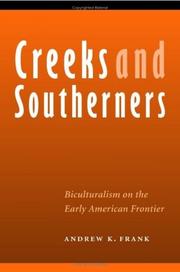
ISBN: 1280374403 9786610374403 0803204949 9780803204942 9781280374401 0803220162 9780803220164 6610374406 Year: 2005 Publisher: Lincoln : Baltimore, Md. : University of Nebraska Press, Project MUSE,
Abstract | Keywords | Export | Availability | Bookmark
 Loading...
Loading...Choose an application
- Reference Manager
- EndNote
- RefWorks (Direct export to RefWorks)
Whites --- Indians of North America --- Children, White --- Creek children --- Creek Indians --- White people --- White persons --- Ethnology --- Caucasian race --- American aborigines --- American Indians --- First Nations (North America) --- Indians of the United States --- Indigenous peoples --- Native Americans --- North American Indians --- White children --- Children, Creek --- Children --- Maskoki Indians --- Muscogee Indians --- Muskogee Indians --- Muskoki Indians --- Mvskoke Indians --- Mvskokvlke --- Five Civilized Tribes --- Muskogean Indians --- Relations with Indians. --- First contact with Europeans --- Social conditions. --- Ethnic identity. --- Cultural assimilation. --- History. --- Culture --- First contact with other peoples
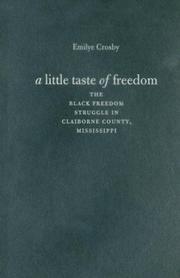
ISBN: 080787681X 9780807876817 080782965X 080785638X 9780807829653 9780807856383 9798890877413 Year: 2005 Publisher: Chapel Hill : University of North Carolina Press,
Abstract | Keywords | Export | Availability | Bookmark
 Loading...
Loading...Choose an application
- Reference Manager
- EndNote
- RefWorks (Direct export to RefWorks)
A community study of the freedom movement in rural, majority-black Claiborne County, Mississippi that explores the impact of the African American freedom struggle on small communities. It analyzes the political and economic issues in the postmovement period, and the impact of the movement and the resilience of white supremacy.
African Americans --- Civil rights movements --- Whites --- African American civil rights workers --- Oral history. --- History --- Oral biography --- Oral tradition --- Afro-Americans --- Black Americans --- Colored people (United States) --- Negroes --- Africans --- Ethnology --- Blacks --- Afro-American civil rights workers --- Civil rights workers, African American --- Civil rights workers --- White people --- White persons --- Caucasian race --- Civil liberation movements --- Liberation movements (Civil rights) --- Protest movements (Civil rights) --- Human rights movements --- Civil rights --- Methodology --- Claiborne County (Miss.) --- Claiborne Co., Miss. --- Race relations. --- Black people
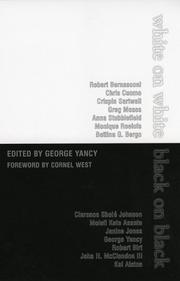
ISBN: 0742568733 0742514803 9780742568730 9780742514805 0742514811 9780742514812 9780742514805 Year: 2005 Publisher: Lanham, Maryland ; Oxford, England : Rowman & Littlefield Publishers, Inc.,
Abstract | Keywords | Export | Availability | Bookmark
 Loading...
Loading...Choose an application
- Reference Manager
- EndNote
- RefWorks (Direct export to RefWorks)
White on White/Black on Black is a unique contribution to the philosophy of race. The text explores how 14 philosophers, 7 white and 7 black, philosophically understand the dynamics of the process of racialization.
Race awareness. --- Blacks --- Whites --- Race --- Physical anthropology --- Race identity of whites --- Racial identity of whites --- Whiteness (Race identity) --- Race awareness --- Black identity --- Blackness (Race identity) --- Negritude --- Race identity of blacks --- Racial identity of blacks --- Ethnicity --- Awareness --- Ethnopsychology --- Ethnic attitudes --- Race identity. --- Philosophy. --- Ethnic identity --- Race identity --- Philosophy --- Race identity of white people --- Racial identity of white people --- White people --- Race identity of Black people --- Racial identity of Black people --- White persons --- Ethnology --- Caucasian race --- Black persons --- Negroes --- Black people
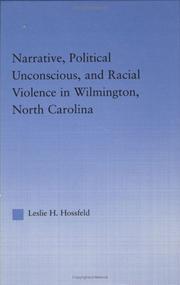
ISBN: 1135931658 1280177616 0203329805 9780203329801 0415949580 9781135931650 9781135931605 1135931607 9781135931643 113593164X 9780415949583 0415949580 9780415650366 0415650364 Year: 2005 Publisher: New York : Routledge,
Abstract | Keywords | Export | Availability | Bookmark
 Loading...
Loading...Choose an application
- Reference Manager
- EndNote
- RefWorks (Direct export to RefWorks)
This work examines the counter-narratives of social actors that may be used as resources to promote and create social change, particularly racial change.
Riots --- African Americans --- Whites --- Subconsciousness --- Narration (Rhetoric) --- Discourse analysis, Narrative --- Narrative discourse analysis --- Unconscious (Psychology) --- Unconsciousness --- Psychology --- White people --- White persons --- Ethnology --- Caucasian race --- Afro-Americans --- Black Americans --- Colored people (United States) --- Negroes --- Africans --- Blacks --- Civil disorders --- Assembly, Right of --- History --- Offenses against public safety --- Political violence --- Crowds --- Demonstrations --- Mobs --- Street fighting (Military science) --- Political aspects --- Wilmington (N.C.) --- Race relations. --- Race relations --- Black people --- Rhetoric --- Narratees (Rhetoric)
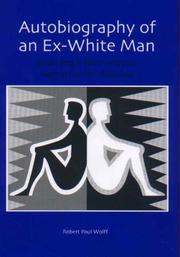
ISBN: 1580461808 1580463134 9786612080555 1282080555 158046677X Year: 2005 Publisher: Rochester, NY : University of Rochester Press,
Abstract | Keywords | Export | Availability | Bookmark
 Loading...
Loading...Choose an application
- Reference Manager
- EndNote
- RefWorks (Direct export to RefWorks)
Autobiography of an Ex-White Man is an intensely personal meditation on the nature of America by a White Philosopher who joined a Black Studies Department and found his understanding of the world transformed by the experience. The book begins with an autobiographical narrative of the events leading up to Wolff's transfer from a Philosophy Department to the W. E. B. Du Bois Department of Afro-American Studies at the University of Massachusetts, and his experiences in the Department with his new colleagues, all of whom had come to Academia from the Civil Rights Movement of the 1960s.
Wolff discovered that the apparently simple act of moving across campus to a new Department in a new building worked a startling change in the way he saw himself, his university, and his country. Reading as widely as possible to bring himself up to speed in his new field of academic responsibility, Wolff realized after a bit that his picture of American history and culture was undergoing an irreversible metamorphosis. America, he realized, has from its inception been a land both of Freedom and of Bondage: Freedom for the few, and then for those who are White; Bondage at first for the many, and then for those who are not White. Slavery is thus not an aberration, an accident, a Peculiar Institution -- it is the essence and core of the American experience.
Wolff's optimistic outlook leads him to express the hope that our acknowledging the realities of America's racial history and present will begin to tear down the formidable barrier to change. He sees this refashioning of the American story as a first step toward the crafting of a truly liberatory project.
Robert Paul Wolff is Professor of Afro-American Studies at the University of Massachusetts-Amherst and the author of numerous books, including Introductory Philosophy and In Defense of Anarchism.
African Americans --- Study and teaching --- Historiography --- Civil rights --- United States --- Race relations --- African American philosophy --- Whites --- Massachusetts --- Amherst (Mass.) --- Biography --- College teachers --- Philosophers --- Wolff, Robert Paul --- University of Massachusetts at Amherst --- African American philosophy. --- Scholars --- Academicians --- Academics (Persons) --- College instructors --- College lecturers --- College professors --- College science teachers --- Lectors (Higher education) --- Lecturers, College --- Lecturers, University --- Professors --- Universities and colleges --- University academics --- University instructors --- University lecturers --- University professors --- University teachers --- Teachers --- White persons --- Ethnology --- Caucasian race --- Afro-American philosophy --- Philosophy, African American --- Philosophy, American --- African American studies --- Afro-American studies --- Black studies --- Study and teaching. --- Historiography. --- Civil rights. --- Faculty --- Wolff, Robert Paul. --- University of Massachusetts at Amherst. --- Race relations. --- White people --- American History. --- Black Studies Department. --- Change. --- Liberatory Project. --- Modernity. --- Racial History. --- Racial Relations. --- Slavery. --- White Philosopher.
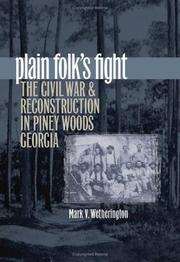
ISBN: 0807877042 1469603659 9780807877043 9781469603650 0807829633 9780807829639 Year: 2005 Publisher: Chapel Hill : University of North Carolina Press,
Abstract | Keywords | Export | Availability | Bookmark
 Loading...
Loading...Choose an application
- Reference Manager
- EndNote
- RefWorks (Direct export to RefWorks)
In an examination of the effects of the Civil War on the rural Southern home front, Mark V. Wetherington looks closely at the experiences of white ""plain folk""--mostly yeoman farmers and craftspeople--in the wiregrass region of southern Georgia before, during, and after the war. Although previous scholars have argued that common people in the South fought the battles of the region's elites, Wetherington contends that the plain folk in this Georgia region fought for their own self-interest.
Plain folk, whose communities were outside areas in which slaves were the majority of the popula
Whites --- Artisans --- Farmers --- Reconstruction (U.S. history, 1865-1877) --- White people --- White persons --- Ethnology --- Caucasian race --- Farm operators --- Operators, Farm --- Planters (Persons) --- Agriculturists --- Rural population --- Artizans --- Craftsmen --- Craftspeople --- Craftspersons --- Skilled labor --- Cottage industries --- Politics and government --- Social conditions --- Political activity --- History --- Georgia --- United States --- State of Georgia --- Peach State --- Empire State of the South --- جورجيا --- Jūrjiyā --- Cheorchia --- Estato de Cheorchia --- Jôrg·ie --- Corciya --- Джорджия --- Dzhordzhii︠a︡ --- Штат Джорджыя --- Shtat Dz︠h︡ordz︠h︡yi︠a︡ --- Джорджыя --- Dz︠h︡ordz︠h︡yi︠a︡ --- Georgie --- Jóojah Hahoodzo --- Τζόρτζια --- Tzortzia --- Πολιτεία της Τζόρτζια --- Politeia tēs Tzortzia --- Georgio (State) --- État de Géorgie --- Yn Çhorshey --- Çhorshey --- Xeorxia --- Estado de Xeorxia --- Khièu-tshṳ-â --- Jorji --- 조지아 주 --- Chojia-ju --- 조지아주 --- Chojiaju --- 조지아 --- Chojia --- Keokia --- Jorjiạ --- ג'ורג'יה --- G'org'iyah --- מדינת ג'ורג'יה --- Medinat G'org'iyah --- Jeorji --- Djòdji --- Džordžija --- Џорџија --- Жоржиа --- Zhorzhia --- Жоржиа Муж Улс --- Zhorzhia Muzh Uls --- ジョージア州 --- Jōjia-shū --- Jōjiashū --- ジョージア --- Jōjia --- Delstaten Georgia --- Jorjiya --- Georgia suyu --- Джорджія --- Штат Джорджія --- Shtat Dz︠h︡ordz︠h︡ii︠a︡ --- Giorgiye Shitati --- דזשארדזיע --- דזשארדזשיע --- Ìpínlẹ̀ `Georgia --- Džuordžėjė --- 喬治亞州 --- Qiaozhiya Zhou --- 喬治亞 --- Qiaozhiya --- US-GA --- GA --- Rural conditions. --- Social aspects.
| Listing 1 - 9 of 9 |
Sort by
|

 Search
Search Feedback
Feedback About UniCat
About UniCat  Help
Help News
News